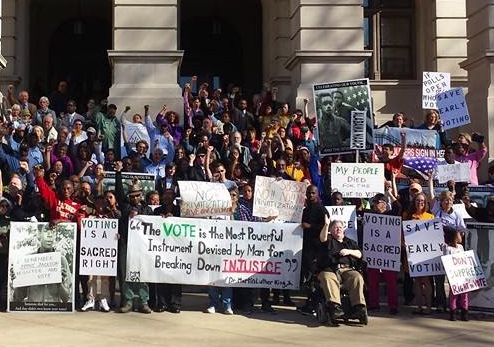Move to slash early voting defeated in Georgia

It's been a major conflict in the voting wars: Across the South and country, Republican-led states have moved to shrink the early voting period before Election Day. But this week, voting rights advocates scored a key victory in a state where the GOP enjoys a strong majority.
On Thursday, March 20, the Georgia House declined to pass HB 891, a measure that would have allowed more than 500 cities and towns to reduce early voting from three weeks to one week. The bill applied only to municipal elections, but it was considered an important test of support for efforts to reduce early voting in state and county contests in the future.
But after passing the state Senate by a 36-16 margin, HB 891 died in the House as the General Assembly closed its 2014 session, ensuring that Georgia won't see any restrictions to early voting until the issue is taken up again in 2015.
Leaders at the League of Women Voters in Georgia and other groups that fought the bill chalk up the victory to a mix of savvy advocacy in the General Assembly and a wide mobilization of support from civil rights, faith and other coalition allies.
As in many states, early voting has been popular in Georgia, especially among historically disenfranchised voters. In 2012, 34 percent of those casting ballots during early voting were African-American; overall, 1.9 million Georgians used early voting that year. Local election officials were also concerned about longer lines and growing pressure on voting sites in the remaining days.
"Counties and cities didn't support the bill," Kelli Persons of the League of Women Voters told Facing South. "They need the availability of early voting to get all their people to the polls."
Despite early voting's popularity, HB 891 originally called for slicing early voting days from 21 to just six in municipal contests. After the bill passed the Georgia House, it drew widespread criticism from civil rights and other groups, including leaders of Georgia's Moral Monday movement. That helped give the League and others room to push a series of compromises. By the time the Senate passed its version of HB 891, a 21-day early voting period was again the norm, and cities and towns would have to gain legislative approval to opt out and decrease voting hours.
With only a day left in the 2014 legislative session, House sponsors declined to take up a vote on the revised bill, and HB 891 was dead.
The defeat of Georgia's plans to cut early voting may signal growing scrutiny of voting restrictions in Southern states -- especially their impact on the local level.
When North Carolina Gov. Pat McCrory (R) signed an elections bill in 2013 that cut a week from early voting, he insisted it merely "compacted the calendar" and didn't reduce early voting hours. But thanks to a little-mentioned provision that allows local elections boards to opt out of the rules as long as the plan is approved by a unanimous vote, 40 of North Carolina's 100 counties have drawn up plans that cut hours off the early voting period. Other North Carolina counties are keeping the same number of hours but have proposed shaving off after-work and weekend voting hours, which critics say makes voting more difficult for those with fixed work schedules.
"The message here is that it's very important, especially after what's happened to the Voting Rights Act, to pay attention to what's happening at the local level," says Persons. She believes the Georgia measure to cut early voting will probably come back next year, but they've sent a clear message.
"They think they can get away with it," she says, "but people are watching."
Tags
Chris Kromm
Chris Kromm is executive director of the Institute for Southern Studies and publisher of the Institute's online magazine, Facing South.
